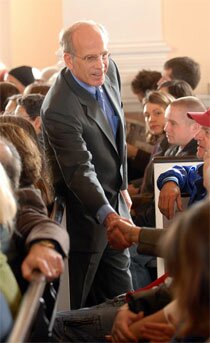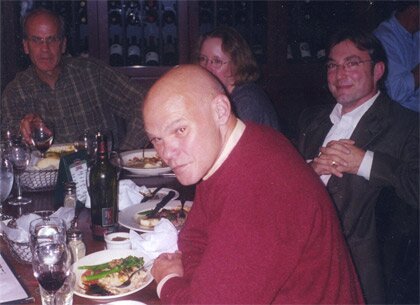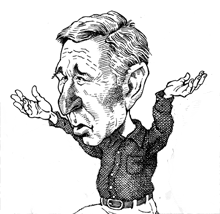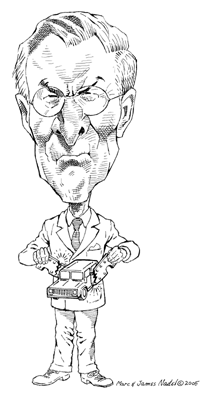The VDB Sit-Down with Peter Welch
Campaign 2006: The Extreme, Two-Eggs-Over-Hard VDB Sit-Down with Peter Welch
Peter Welch is many things: Hartland Democrat, State Senator, Senate President Pro Tem, and now a flat-out candidate for the U.S. House seat currently held by Bernie Sanders. He is also a guy with a huge ungainly bandage on his thumb.
When we met for the sit-down — in the back of Henry’s Diner in Burlington — Welch told me about his “twelve thousand dollar thumb”: apparently he’d sliced it open on a soda can (purchased at one of former Republican National Committeeman “Skip” Vallee’s Maplefield’s quick-stops), and then stacked some wood the next day without gloves.
Within days Welch was being operated on for multiple aggressive infections, and his medical tab was hovering at around 12k. Everything is under control now, though, Welch assured me.
Still, it seemed a fitting cautionary tale to begin the conversation: a tale not only about the dangers of a health-care system in which fighting an infection can cost enough to bankrupt most low-income families — but about the dangers of “Skip” Vallee as well.
 Henry’s proved a perfect venue — warm, uncrowded, badly lit, excellent bacon — but there was one glitch: the diner’s ceiling is punctuated at regular intervals by speakers, and the cook leans to Oldies, specifically ‘60s and ‘70s sugar-pop ballads. And the volume is aggressive.
Henry’s proved a perfect venue — warm, uncrowded, badly lit, excellent bacon — but there was one glitch: the diner’s ceiling is punctuated at regular intervals by speakers, and the cook leans to Oldies, specifically ‘60s and ‘70s sugar-pop ballads. And the volume is aggressive.
So I dickered with the waitress before Welch arrived, and, on the more-or-less explicit promise of a fat tip, got the volume dropped a hair. But the miniature tape recording of the conversation is still randomly and loudly punctuated by songs like “My Baby Does the Hanky Panky” and “Quinn the Eskimo.”
Occasionally, though, there’s a sweet serendipity: Ben E. King’s “Stand by Me” plays all through the section of the interview where Welch describes courting the active support of the seat’s current occupant, Bernie Sanders.
And that’s enough to make smoke get in your eyes.
* * *
VDB: I’ve really been dying to ask you a question that has nothing to do with your candidacy. I’ve wanted to ask it for years now. This goes back to the only time you and I ever met before, and that was a dinner for James Carville, when he came to the University of Vermont to give the Aiken lecture.
It was September 28, 2001 — just two weeks or so after 9/11 — Carville comes to town, and you and I and some other people wound up at dinner with him, at New England Culinary. And as I remember it, there was a little — I don’t know — tension or something between you two. So I went back to my notes from that night, and this is what I wrote.
Welch: I’m looking forward to this.
VDB: [Reading from notes] “Peter Welch was clearly not sold on Carville, even baited him a little, asking him, ‘Who’s going to win in 2004, who are you backing, why won’t you tell us, you’re the man, right?’ And Carville gave Welch answers that were occasionally chilly in response.”
Also in my notes I have this detail [reads again]: “Carville made several emphatic points by stabbing his finger into the bread basket, into a slice of bread there, actual repeated finger/bread contact, but did not then remove or otherwise acknowledge the stabbed bread.” [Puts down notes]
So my question is, What was the dynamic from your point of view? Did you find Carville off-putting politically or personally? Or was it maybe that you were really hungry and you were sort of miffed about the bread?

Welch: I thought he was there performing, and not really seriously engaging with us. And when I’m in a situation like that, I feel as though I’m just a prop. He was here, he was getting paid to be here, and sometimes when you’re at a dinner like that the performer actually sits down and engages a little.
But I didn’t get a sense that Carville was engaging — it was full-time, all-time performance. It was annoying. He was kind of a show, he’s interesting and entertaining, incredibly smart, but that’s what it was.
VDB: Right. That’s all through my notes, in fact. When he walked into the restaurant he walked past the knot of us waiting for him, and did this sort of tour of the restaurant. He’s pretty visually recognizable, so he clearly wanted everyone in the restaurant to get a good look. And he banged on the table a lot, hard, so that the silverware really audibly rattled.
Welch: I’m James Carville. I’m here. That was it.
Henry’s Waitress: You gentlemen doing okay down here?
Welch: Yup. Everything’s great.
VDB: I’ve seen your campaign ads up on a blog that I like a lot called Talking Points Memo. It seems as though, with Bernie Sanders being such an icon of the Left, it seems as though there’s a really good draw there for the Left half of the blogosphere. Do you find you’re getting more contributions there than you expected?
Welch: It’s a mystery to me. No, I wouldn’t say I’ve really caught on on the Web at all. I’ve got a long way to go on that. And Bernie’s an established person, with an identity. You know what’s interesting is you look at our fundraising reports in that first period, I raised a lot more money in Vermont, as I understand it, than Bernie did. What he had was a network of thousands of small contributors across the country. And my political career obviously is here, and the aspect of my candidacy that I’m quite proud of is the number of Vermonters that have contributed to my campaign.
VDB: 650 or so? Somewhere around there?
Welch: In the first report. I’ll be over 1000 in this one. We’ve done real well on that.
VDB: Okay, second-to-last reference to Carville. This is something Carville said the next day at his Aiken lecture.
Welch: You went home and took all these notes?
VDB: Yeah, how could you not? It was fascinating. And in my case I was writing a novel about the Clinton presidency [The X President], and Carville is a main character in it. In fact, at dinner that night I leaned over to him kind of tentatively and told him as much, that he was a main character in my book, and he said, “I bet so.” And that was it, went back to his fish.
Welch: But God he was funny. Incredibly funny.
VDB: So at the Aiken lecture, Carville said, “The biggest lie ever told in American politics, absolutely biggest lie, wasn’t Ronald Reagan and Oliver North sayin’ they couldn’t remember sellin’ missiles to the Ayatollah. And it wasn’t Bill Clinton shakin’ his finger in the faces of the American people saying he never had sex with Monica Lewinsky. The biggest lie ever told in American politics was Ralph Nader saying it didn’t matter which candidate got elected in the 2000 presidential election — that was a lie, because it profoundly matters.”
So I wanted to ask your thoughts about this. Obviously at a larger level, this is about third-party candidacies. And in this race, one of the possibilities is that there might be a third-party challenge.
Welch: I think the Nader candidacy was devastating. It really did make a difference. I mean, there’s consequences to our choices. That’s the thing about politics that I actually really enjoy, is the tension that all of us have in politics if we’re awake, if we’re tying to do it honestly, constantly trying to make a decision in the here-and-now about what’s the moral thing to do, what’s the most we can accomplish.
And then make that decision with a real awareness about what the constraints are, what the limitations are, what the real world is. And what I find constantly is that I’m always not ever certain if I’m stopping short of all that I could do or not pushing hard enough.
So I think sometimes a third-party candidacy is totally right. The circumstances may require it. Look back at Burlington when Bernie ran and won by only a few votes. There was kind of an impacted Democratic leadership, where young Democrats with progressive energy didn’t have any room.
That was a candidacy that made a lot of sense in those circumstances. Ralph Nader in the Bush/Gore race didn’t, and we’re seeing the consequences.
We have the most radical presidency now, at least that I’ve ever been aware of in my lifetime. [In this race] I believe the main question is whether we’ll have a Democratic Congress, that’s within our grasp. And a major building block in that will be winning the seat in Vermont.
Right now Bush controls the Presidency, and he controls the Supreme Court. He was elected by the  Court — pretty astonishing, you know, it was an activist Court that by a political decision reversed a unanimous decision by the Florida Supreme Court. And then you’ve got a Republican House and a Republican Senate, a rubber stamp.
Court — pretty astonishing, you know, it was an activist Court that by a political decision reversed a unanimous decision by the Florida Supreme Court. And then you’ve got a Republican House and a Republican Senate, a rubber stamp.
So the fundamental question in this election, for this district and every other district, I believe, is whether we’re going to put a check and a balance on the Presidency.
VDB: Just to follow up on that, it seems to me that the political play of the year in Vermont was getting Bernie’s endorsement, but not just that. I would have expected him maybe either to stay neutral, or to endorse but not campaign.
But now he’s come to actively campaigning for you, and just a few days ago putting out a very strong statement [discouraging a third-party Progressive challenger]. So how did that come about?
Welch: Well, I have some history with Bernie, first of all. I was the first Democrat in 1990 to endorse him. I worked with him in the ‘80’s when I was the Senate President and he was the mayor of Burlington. And I’ve supported him in all his races.
There’s two things, I think, that happened. Number one, the Democratic Senate Campaign Committee, they wanted to get behind Bernie early on, because of the obvious — he was the person that could win the seat. Bernie’s voted with the Democrats, and he’ll clearly vote with them to organize.
And the Democratic Congressional Campaign Committee — so this is some stuff that happened in Washington — is desperate to win this seat, and I know that the folks on both those committees talked to each other and wanted there to be mutual cooperation. With the shared objective of diminishing the Republican majority.
Secondly, Bernie indicated early on that he was going to support the Democrat, and that was before it was at all clear who that Democrat would be. And of course, Bernie started calling around to people, myself included, asking, Will you support me, and many Democrats said, Sure, and we’re looking for some support from you for the Congressional candidate.
So clearly there was discussion about that. And as Bernie put it, and I think he put it pretty well, it’s not like there’s quote a deal unquote, but clearly there’s a mutual interest, people with a common objective to win the Congressional seat and the Senate seat.
And then I started my campaign. So early on, what I did was to work as hard as I could and as quick as I could to get endorsements and to raise money. And eventually many of the Democrats who were considering a run said they’d support me. And midway along in that I invited Bernie to an event that I was doing in Norwich on the green.
VDB: Is that the one you have pictured on your website?
Welch: Yeah, I gave a really terrible speech there. I’m glad that’s not on the website. It was terrible.
VDB: Compared to Bernie? Or to your personal best?
Welch: In comparison to — who’s that goofball that always used to run for President? — Pat Paulson. I was pretty bad. It was outdoors — it’s a learning process, let me tell you.
But he came to that and I would try and be as helpful as I could to him. But as it became clear that I was going to be the nominee, Bernie became more helpful. And then Patrick [Leahy], who’s been extremely helpful, agreed to host a fundraiser for me in DC, and Bernie came to that. And that’s the time when he was the most explicit and generous in his comments about me, you know.
I also do believe that Bernie absolutely does not want that seat to go into Republican hands. His judgment is that a three-way race favors the Republican.
VDB: Definitely. And that speaks to my next question. You’ve been adept at getting your name in the news, on the torture issue, on prescription drugs. But every time the story runs the same way when they write it up: you announce a really solid position, then they cut to [Vermont Adjutant General] Martha Rainville’s spokesperson, who says that Martha’s not a candidate right now, if and when she’ll have more to say.
On a scale of 1-100 how annoying is that?
Welch: For me?
VDB: Yeah. And what do you do about that? Clearly now Mark Shepard’s in the race[creating a contested Republican primary], and she has a different dynamic to contend with.
Welch: It’s not been annoying at all, frankly. What I have to do, at this stage of the campaign, is build my base. I have to get out and meet with people, and formulate my positions, and really build an infrastructure — an intellectual infrastructure, organizational infrastructure, and a financial one.
So I don’t get annoyed by it. I do think it’s kind of odd for that to be the position of a person who’s very actively pursuing Congressional office. And I actually think the press is being a little easy on that.
VDB: A little? I would say they’re giving her a complete pass, because if somebody routinely asserts that they can’t make a comment because they’re not running, I don’t see why you’d keep going back to them in your news stories.
Welch: I would agree with that. One of the disciplines you have to develop when you’re running for office is that you can’t allow yourself to be annoyed by what the press does or doesn’t do. It’ll drive you crazy.
Whatever is going on in the quote [Rainville] exploratory committee, I know — because I’m a candidate — I know how much energy goes into quote exploring. There’s no difference between quote exploring and running. Except some legal technicalities. In terms of energy, your attention, the emotional involvement, the raising expectations among your supporters —
VDB: And raising money.
Welch: And raising money. And I actually think that a person who has a uniform on shouldn’t be talking about political issues. I think that’s one of the great things in our country, that we have a military that is clearly willing to take orders from the elected officials. And as you know the regulations in the military are very strict about no political activity. You gotta have that separation.
And the whole major question in this election is going to be the wisdom and the orders of the Commander in Chief. And if you’re in the military, your job is to show up. If the President says Iraq, you say, what time? If it’s Syria, if it’s Iran, you show up. And I admire that. I think that that’s important to our democracy that we have a military that’s willing to accept the orders of the elected representatives.
So that’s the dilemma. But you really can’t do both.
Henry’s Waitress: You two okay? I didn’t want you to think I forgot about you back here.
Welch: I’ll take a warm up on the coffee, if I could. Thank you.
VDB: Since we got talking about Iraq, I was very pleased to see you take a firm stand on the torture issue, and on the withdrawal of troops. But I just want to get a little nuance there. The Vermont Guardian had a story headlined that you had called for an “immediate withdrawal” of troops. Then down in the story it talks more about bringing 20,000 troops home —
Welch: Last year.
VDB: Right, bringing 20,000 home by the end of 2005, which is more or less the bump up in deployment to police the December elections. Then on your website you say it’s time to “plan for withdrawal,” which seems a more moderate formulation. So I’m wondering, how immediate is the withdrawal that you’re calling for?
Welch: I’d like to have the troops out this year.
VDB: All of them.
Welch: Yes.
VDB: Would you leave a chunk there as a rapid reaction force or —
Welch: Well, I’d like to have the troops out this year. I think in order to realistically achieve that goal, there would have to be an aggressive commitment to planning the implementation of that goal.
Two things Bush did in the war: one is he went to war when he shouldn’t have, and two, he completely disregarded the advice of his generals on what you should do and how you should do it. They [the civilian leadership] wanted to do it on the cheap. I don’t believe that those of us who are against the war, and now want to bring our troops home, can disregard the sensible advice of the military commanders on what you have to do and how you have to do it.
It’s up to the political leaders to say, we have to make a change here, it’s time to bring our troops home. You’ve got to tell us, General, how do we do it so we maximize the safety of our troops, how do you do it so we minimize the possibility of political violence in Iraq.
 The other thing I really do think is important is to fire Rumsfeld. Normally that sort of symbolic activity I’m not a big fan of, but in this case I am, because he’s the guy — he and the White House Counsel — that were coming up with the justifications for torture. He should go. It’s the way that we tell our allies we’re serious about changing our direction.
The other thing I really do think is important is to fire Rumsfeld. Normally that sort of symbolic activity I’m not a big fan of, but in this case I am, because he’s the guy — he and the White House Counsel — that were coming up with the justifications for torture. He should go. It’s the way that we tell our allies we’re serious about changing our direction.
I don’t want to keep forces in Iraq, and I think we should be renouncing any intention, long-term, of keeping forces in Iraq.
VDB: So stop building those bases there.
Welch: I don’t think we should have long-term bases in Iraq. I do not. And I think we should make it clear that that’s not our intention. We might have to have some forces somewhere in the region, some capacity to respond to situations that may require it.
If we state as a goal that we’re leaving by the end of the year, it puts the Iraqis on notice that they’ve got to get serious about making the political accommodations they’re going to have to make internally to be able to have some sort of stability in their society.
VDB: Okay [searches notes] maybe the most difficult question yet. In almost every way I’m hoping you continue Bernie’s efforts in the House, but he had one terrible moment this past year, I think, and that was his support for a bill shielding gun manufacturers from law suits. Now, I understand the statewide politics of this — Vermont is a rural state, with lots of gun owners — but I still thought it was an unconscionable vote in some ways.
Bernie’s not the only statewide politician to move right on the gun issue, of course. Dean touted his 100% NRA rating when he ran nationally in 2004. Where will you stand on guns in general, and what about industry-issues like the liability shield?
Welch: I don’t know about the liability shield, I’ll have to think long and hard about that. In the state, I’ve had a 100% NRA rating. Bernie has, Howard Dean has. We’re very lucky in Vermont that here it’s totally different than in, say, New York City.
Here, basically, guns are used responsibly by hunters. And a lot of us are in small towns — I come from Hartland — where these hunter-safety courses, there are some of them taking place at venues like our local schools, and you’ve got grandfathers in there teaching grandkids, including granddaughters, responsible hunter safety.
And I support that. I agree with Bernie and Dean that we don’t want to be messing with a way of life that’s pretty important to people, and they’ve done it pretty responsibly.
VDB: Okay, last question, circling back to Carville and whether you should or shouldn’t say who you’re supporting in the next Presidential election. He was supporting Hillary back in 2001, which I called “odd” in my notes. But it doesn’t seem so odd any more; she’s the front-runner now, if one exists. So who do you like in 2008 and why?
Welch: I have real reservations about Hillary, real reservations, because of her positions on the war. Both because she voted for it, and for her continuing positions on it. Other than that, I really don’t know.
VDB: Just wondered if anyone jumped out at you.
Welch: Well, as you know, I just spent the day with [Russ] Feingold, and Bernie. And I was very impressed with Feingold. He kind of had the Dean bluntness and directness, but kind of a softness to him, too. It makes him very accessible, you feel comfortable talking to him. [Gives a cagey smile] But more than anything, I’d like there to be a progressive who’s able to win.
[With that, Freddy Fender’s “Before the Next Teardrop Falls” began to float through the diner, and there was nothing left to do but split the tab, tip heavily, thank Peter Welch, and walk down to the water for the Heavy Thinking that should ideally follow a Belgian waffle and a really good couple of eggs.]
on January 17th, 2006 at 10:26 am
[…] Below this week’s MMRS post is a biggie from Friday: a long interview with Congressional candidate Peter Welch, in which he disses James Carville and Nader, gives full props to Bernie and Feingold, and presents his infected thumb as a postmodern cautionary tale. […]
on May 3rd, 2006 at 8:26 pm
[…] But Welch had looked at the chaos in Iraq, and he had this to say when VDB interviewed him in December: […]
on October 26th, 2006 at 6:32 pm
[…] Of course, Peter Welch sat down and answered a series of no-wiggle questions with a series of no-wiggle answers. (BTW, have you guys ever read that sit-down? If not, it’s right here, and it’ll maybe give you some clear insights into where Welch stood in December, which is to say where he stands currently — yes on withdrawal, no on permanent basing, yes on 86-ing Rumsfeld.) […]